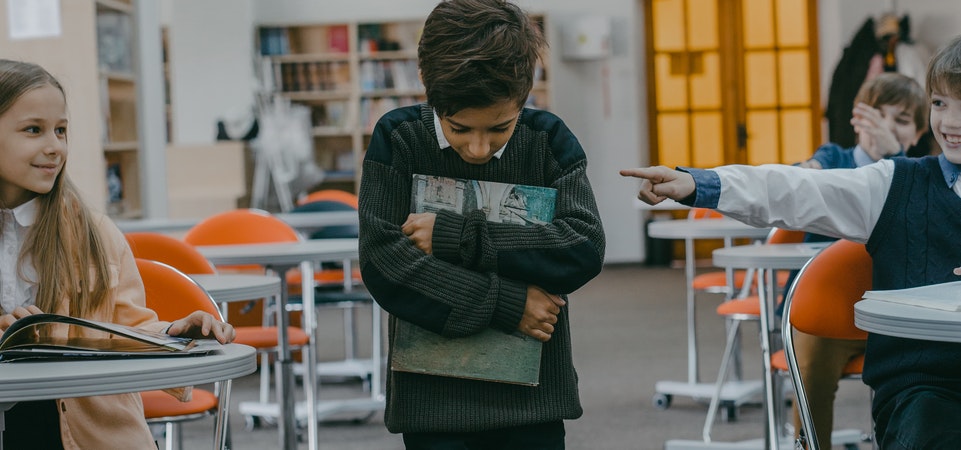BULLYING, CYBERBULLYING AND CYBER PREDATORS
Unfortunately, a sexually abused child may become the target of bullying, cyberbullying or a cyber predator. Bullying consists of numerous activities including physical, verbal and social behaviors. The following section covers the definition of bullying, signs of bullying, effective ways to help your child and tips for safely using social networking sites.
Florida has some of the strictest anti-bullying laws in the nation. In addition, the Florida legislature has shown its commitment to making schools a safe place for students by passing the Jeffrey Johnson Stand Up for Students Act.
BULLYING

As defined by Olweus (2001), “A student is being bullied or victimized when he or she is exposed, repeatedly and over time, to negative actions on the part of one or more students.” Bullying consists of numerous activities including physical, verbal and social behaviors.
How do I know if someone is bullying my child?
- Physical injuries (for example, unexplained bruises and scratches)
- General unhappiness
- Reluctance to go to school (often accompanied by vague excuses to stay home)
- A decline in academic performance
- Getting into trouble more often at school
- Moodiness, withdrawal, tension and tears after school or after being with friends
- Talk of hating school and having no friends
- Torn clothing
- Refusal to discuss what’s happening at school
- Major changes in relationships and friendships with others
- Time spent with a peer who seems mean or abusive
How Parents and Caregivers Can Help
- Talk with your child. Find out when and where the bullying is happening, noting dates and times. Take screen shots of electronic communication (cell phone messages, posts on social media, etc.) and make copies of anything else.
- Give your child the power to make some decisions about how he or she believes the problem should be handled and then help achieve those goals. Bullying is often about taking away power. You can reverse that dynamic; just make sure you are empowering your child.
Let your child know you do not blame him or her for the bullying. Only the bully is to blame.
- If your child is being physically harmed, you must intervene. Gather evidence and report it to the police.
- Start an anti-bullying campaign at your child’s school. By cooperating with the local school administration, you can possibly arrange to bring an approved anti-bullying curriculum or resources to support a school-based preventive program. Prevention can help stop bullying before it ever starts.
CYBERBULLYING

Cyberbullying is somewhat similar to traditional bullying, except it only occurs through the tools of technology such as e-mail, instant messaging, game sites, chat rooms or social networking sites. It includes digital messages or images sent to a cell phone.
Unlike traditional bullying, only one act of cyberbullying is needed to affect a child’s life. In Cyberbullying Through the New Media: Findings from an International Network, Peter K. Smith and Georges Steffgen state, “a single act by one perpetrator may be repeated many times by others, and experienced many times by the victim.”
There are warning signs that may indicate that your child is experiencing cyberbullying. Your child may appear depressed or withdrawn, or not want to go to school. He or she may begin to avoid social activities and may seem upset or angry after being on the phone or computer. Your child may also become obsessed with checking their messages or social networking sites because he or she may be worried about what other individuals might be posting.
How Parents and Caregivers Can Help
- As with traditional bullying, children often feel shame and embarrassment when they are the target of cyberbullying. Try to reduce these feelings by letting your child know he or she is not to blame.
- Do not address the bullying by prohibiting your child’s access to technology. Technology offers children an important gateway to education and socialization with peers.
- Encourage your child not to give out his or her cell phone number to anyone other than trusted friends and family. If necessary, change the phone number.
- Block online messages and identities, track IP-addresses and change passwords and/or usernames.
- Contact your website administrator and report the abuse and ask to block the abuser permanently.
- Close down the current social media accounts on which the bullying is occurring. Open new ones with a different name or names. Use security settings to allow only invited friends to visit the new webpages.
CYBER PREDATORS

A typical child is engaged in social networking for an average of 44.5 hours each week. According to Lauren’s Kids, Don’t Miss the Signs in a Digital World, one in five minors are sexually solicited online; in 82% of online sex crimes against minors, the offender used their social networking site to gain information about them. Sadly, one in five teens has electronically sent or posted nude or seminude pictures of themselves online.
While children may understand social media and social networking better than any adult in their world, most adults know that nothing online is private and that every detail children post can be used against them. Talking to your child about the dangers of social networking as a means of sexual exploitation is the best defense.
How Parents and Caregivers Can Help
- Let your child know he or she can always talk to you if something happens online that makes him or her uncomfortable.
- Explain that predators often pretend to be of the same age and gender as your child. They may even post false photos of themselves to trick your child into believing they are peers.
- Warn your child to never meet with an unknown cyber “friend.”
- Use parental control options on your child’s computer so you can browse his or her online history and trace potentially abusive contacts.
- If possible, have your child use a home computer that is in an area shared with adults, such as a living room, family room or kitchen.
- Have your child sign the online safety pledge.
- Notify law enforcement if you suspect your child is being sexually exploited through social networking.
In Crisis?
FLORIDA : Florida Council Against Sexual Violence
Crisis Hotline : 1.888.956.RAPE (7273)
UNITED STATES : RAINN (Rape Abuse Incest National Network)
Crisis Hotline : 1.800.656.HOPE (4673)
Lauren’s Kids is a 501(c)(3) nonprofit organization, tax I.D. number 26-1252588. Read our Privacy Policy. View A Guide to Hope and Healing references. Visit LaurensKids.org to learn more.
©2021, LAUREN’S KIDS. ALL RIGHTS RESERVED.
